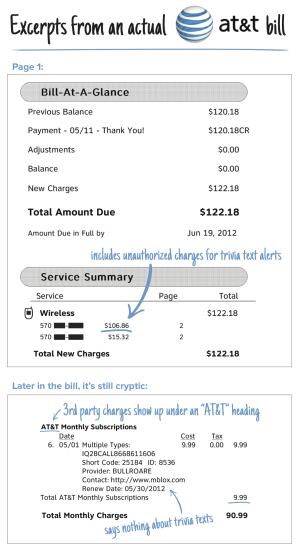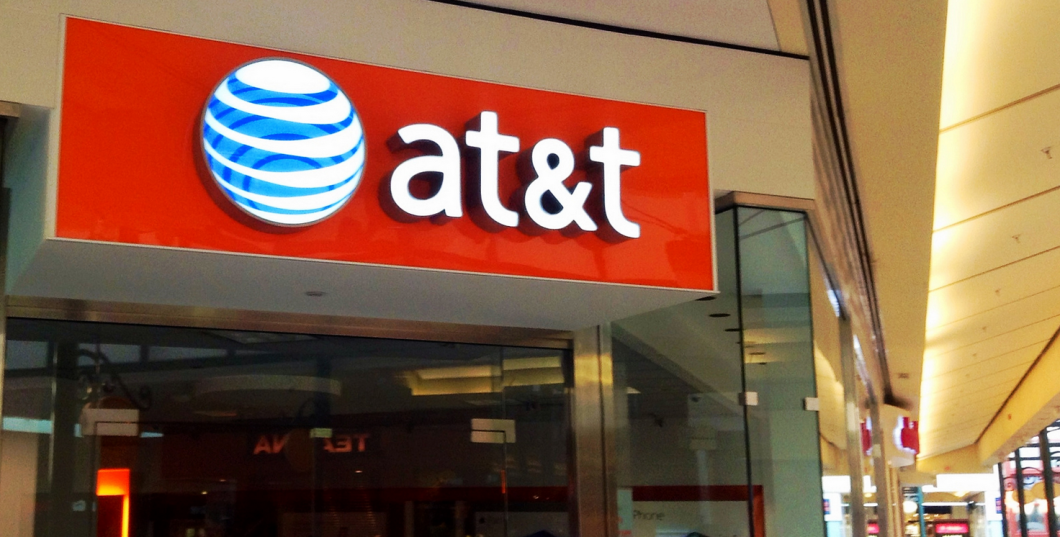AT&T To Pay $105 Million To Settle Wireless Bill-Cramming Charges

This example of an actual AT&T wireless bill shows how the company tried to make third-party charges less obvious. Click to enlarge.
Like previous cramming allegations against T-Mobile, the charges were for unasked-for and unauthorized subscriptions for things like ringtones and text messages containing love tips, horoscopes, and “fun facts.”
The FTC claims that AT&T kept about 35% of all the fees it took in from these charges; in some cases, the company earned upwards of 40% of the revenue from the third-party charges.
According to the complaint, AT&T tweaked its refund policy in Oct. 2011, restricting the amount of money that could be refunded to crammed users to only two months of bogus charges, regardless of how long the cramming had been going on.
Additionally, AT&T allegedly denied refunds to some customers who had been hit with the illegal charges and sometimes directed them to contact the third parties to get their money back.
Feds cite a Feb. 2012 e-mail in which one AT&T employee wrote that “Cramming/Spamming has increased to a new level that cannot be tolerated from an AT&T or industry perspective.” In spite of this alarm, the company continued allowing the charges for nearly two more years.
AT&T also allegedly made it difficult for subscribers to see they were being overcharged by hiding these charges in the fine details of users’ monthly invoices.
“On both the first page of printed bills and the summary of bills viewed online, consumers saw only a total amount due and due date with no indication the amount included charges placed on their bill by a third party,” explains the FTC, which says the problem was further compounded by the description of these charges as “AT&T Monthly Subscriptions.”
$80 million of the settlement is slated to be refunded to affected AT&T wireless customers. Another $20 million will be distributed to the 50 states and D.C. for their involvement in the investigation, with a final $5 million penalty being paid to the FCC.
Consumers who believe they were charged by AT&T without authorization can submit a refund claim via www.ftc.gov/att.
Vermont Attorney General Bill Sorrell, a longtime foe of bill-cramming, was in the forefront of the states’ efforts to investigate AT&T’s actions.
“I’m pleased that AT&T will no longer facilitate fraud by placing bogus charges on their customers’ phone bills, and that about 45,000 Vermonters will have the opportunity to recover their money,” said Sorrell following today’s announcement. “I hope that—going forward—the mobile telecommunications industry pays as much attention to its customers’ welfare as it does to its bottom line. I trust it knows by now that if it doesn’t, law enforcement will be at its doorstep.”
Maryland Attorney General Douglas Gansler was also on hand for today’s announcement.
“This settlement provides refunds for overcharged consumers and puts in place tough standards to prevent unauthorized charges from appearing on consumers’ bills,” he said in a statement.
When reached for comment, a rep for AT&T confirmed the settlement and provided Consumerist with the following statement:
In the past, our wireless customers could purchase services like ringtones from other companies using Premium Short Messaging Services (PSMS) and we would put those charges on their bills. Other wireless carriers did the same.
While we had rigorous protections in place to guard consumers against unauthorized billing from these companies, last year we discontinued third-party billing for PSMS services.
Today, we reached a broad settlement to resolve claims that some of our wireless customers were billed for charges from third-parties that the customers did not authorize. This settlement gives our customers who believe they were wrongfully billed for PSMS services the ability to get a refund.
According to AT&T, it put an end to the questionable practice in Dec. 2013. It claims to be the first one to halt cramming, though T-Mobile also says it pulled the plug on these charges around the same time.
In July, a report from the Senate Committee on Commerce, Science and Transportation found that wireless providers turned a blind eye to cramming because it resulted in billions of dollars in revenue for carriers.
While it’s believed that all wireless providers allowed bill-cramming of some sort, this is the first such settlement reached with any of the country’s mobile phone services.
Earlier this year, the FTC sued T-Mobile, claiming it made hundreds of millions of dollars from bill-cramming.
T-Mobile’s response to that lawsuit was to claim that it shouldn’t be sued because it stopped allowing these illegal charges.
In 2013, the FTC sued a company called Wise Media in federal court, alleging that it had made millions by placing unauthorized charges, usually around $9.99/month, for so-called “premium services” that sent text messages with horoscopes, flirting, love tips and other information.
Wise Media allegedly attempted to hide its charges on customers’ bills by using codes that made the cost appear to be something more legitimate than a horoscope or love-advice text service.
Want more consumer news? Visit our parent organization, Consumer Reports, for the latest on scams, recalls, and other consumer issues.


